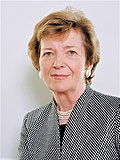 | |
 | |
| Abbreviation |
|
|---|---|
| Formation | 20 December 1993 [1] |
| Type | Agency |
| Legal status | Active |
| Headquarters | Geneva, Switzerland New York City, United States |
Head | Volker Türk (High Commissioner for Human Rights) [2] |
| Employees | 1,368 (2022 [3] ) |
| Website | ohchr.org |
| This article is part of a series about the |
| United Nations |
|---|
 |
| Charter |
| UN System |
| Funds, programmes, and other bodies |
| Specialized agencies |
| Membership |
| History |
| Resolutions |
The Office of the United Nations High Commissioner for Human Rights [a] (OHCHR) is a department of the United Nations Secretariat that works to promote and protect human rights that are guaranteed under international law and stipulated in the Universal Declaration of Human Rights of 1948. The office was established by the United Nations General Assembly on 20 December 1993 [4] in the wake of the 1993 World Conference on Human Rights.
Contents
- Functions and organization
- Mandate
- Purpose
- Organization
- High commissioners for human rights
- Criticisms
- See also
- Notes
- References
- Further reading
- External links
The office is headed by the high commissioner for human rights, who co-ordinates human rights activities throughout the United Nations System and acts as the secretariat of the Human Rights Council in Geneva, Switzerland. The eighth and current high commissioner is Volker Türk of Austria, who succeeded Michelle Bachelet of Chile on 8 September 2022. [2]
In 2018–2019, the department had a budget of US$201.6 million (3.7 per cent of the United Nations regular budget), [5] and approximately 1,300 employees based in Geneva and New York City. [6] It is an ex officio member of the Committee of the United Nations Development Group. [7]










